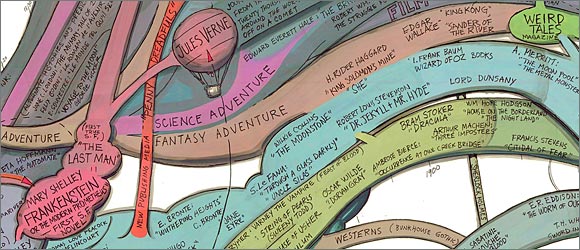Five SF/F Book Review Blogs Worth Reading
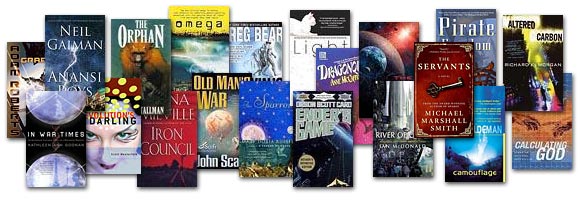
The interwebs abound in science fiction and fantasy book review blogs – but how do you find the really good ones? The best sites I’ve found have come by way of chance discovery or through recommendations from other fans or blog rolls on other sites. I’ve compiled a list of nearly 100 for the SF/F Blog Roll you see in the sidebar but it’s still a bit much to pick through so I thought I’d highlight a few in particular that I want to share. I’ve limited my selection to five single-author blogs that you may have missed rather than point out the obvious ones you’ve likely already found.
Tethyan Books
Reviews of Science Fiction and Fantasy novels by a finicky physicist
Tethyan Books is only a few months old but already has a plethora of great reviews. From classics like Frederick Pohl’s Gateway to cutting edge new books like Lauren Beukes’ Zoo City, Allie reviews a wide variety of books from many different sub-genres of SF/F. She’s also a WWEnd member and posts a lot of her reviews here so she gets bonus points in my book.
Like the title says, this blog is about the Hugo Award – but not just books and not just the Hugo. Ryan’s focus is Hugo winning books, movies and television but he’ll dip into other awards like the Clarke and BSFA from time to time. He’s been at it since 2009 – posting an average of 10 reviews a month so there’s plenty to chew on here – you’ll want to dig deep.
Top Science Fiction Novels of All Time
This blog is dedicated to reviewing the top 100 Science Fiction novels of all time – as selected by Sci Fi Lists. A pretty big task if you ask me but Andy has posted 57 reviews thus far. The blog is a bit quirky though. To keep the reviews in order from 1-100 Andy has posted them with bogus dates far in the future. For example, his Ender’s Game review, #1 on the list, is posted October 1, 2014 so you have no idea when he actually posted it. Kinda’ strange but the reviews are good quality and include the usual suspects you’d expect in a "best of" list.
The Little Red Reviewer boasts an eclectic blend of SF/F sub-genre reviews from classic old-school SF (Asimov and Heinlein etc.) to hard-core blood-and-guts fantasy (Abercrombie and Martin etc.) and most everything in between. Redhead’s got over 100 reviews so be sure to look over her review index.
Val’s Random Comments
Almost entirely random comments on whatever it is I am reading at the moment…
Val, not his real name, offers up science fiction and fantasy reviews that are much more than random comments. Confused? Just go with it. The reviews are excellent and plentiful with almost 200 to choose from so don’t stop after the first page.
Bonus blog:
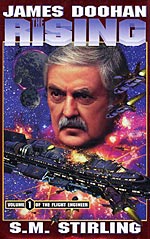
Good Show Sir
Only the worst Sci-fi/Fantasy book covers
While not a review site, this blog is still awesome. It’s a pictorial romp through the horrible cover art that too often adorns genre books – the ones that you’d be embarrassed to read in public. I’ve got some of these in my own collection and I’m sure you’ve run into many of them on the bookstore shelves yourself. The best thing about the site is that you can submit your own pics and snide remarks. I’ve been doing this for years with my friends so you can bet I’ll be snapping some shots the next time I go book shopping. I’ll be looking for The Giant Floating Head of James Doohan.™
Check out these sites and, if you like them, help spread the word by liking them on your Facebook or tweet ’em or join or add them to your RSS feed or, even better, tell your friends about them.
So what sites do you frequent for reviews and why?
History of Science Fiction Info Graphic
Take a look at this amazing info graphic by artist Ward Shelley over at Places & Spaces. Shelley has mapped out the history of Science Fiction in a fascinating amorphous tentacular blob that takes you through the development of the genre from Gilgamesh to New Space Opera with hundreds of famous and sometimes unexpected stops in between.
The paths twist and turn and branch out through the long years in a hypnotic pattern of movements and cultural change. The many genres of fiction that derive from the same roots of "Fear and Wonder" disappear into their own universes leaving us to wonder what those places might look like.
There is so much detail here you could pore over it for hours and still find great new things. The example books on this chart alone would make a titanic reading list! Take a look and tell us what you think.
Thanks to Wintermute for the tip.
Time to Die?

Last week comedian Patton Oswalt wrote an editorial for Wired magazine suggestively titled "Wake Up, Geek Culture. Time to Die." He makes the case that geek culture, long submerged in the subconscious of national (and global) culture, has clawed its way up into public consciousness, and that this rise is leading to its inevitable death. Geek culture, he posits, shrivels up in the sun, and can only thrive beneath the damp topsoil of the larger culture.
Admittedly, there’s a chilly thrill in moving with the herd while quietly being tuned in to something dark, complicated, and unknown just beneath the topsoil of popularity. Something about which, while we moved with the herd, we could share a wink and a nod with two or three other similarly connected herdlings.[…]
Fast-forward to now: Boba Fett’s helmet emblazoned on sleeveless T-shirts worn by gym douches hefting dumbbells. The Glee kids performing the songs from The Rocky Horror Picture Show. And Toad the Wet Sprocket, a band that took its name from a Monty Python riff, joining the permanent soundtrack of a night out at Bennigan’s. Our below-the-topsoil passions have been rudely dug up and displayed in the noonday sun. The Lord of the Rings used to be ours and only ours simply because of the sheer goddamn thickness of the books. Twenty years later, the entire cast and crew would be trooping onstage at the Oscars to collect their statuettes, and replicas of the One Ring would be sold as bling.
The topsoil has been scraped away, forever, in 2010. In fact, it’s been dug up, thrown into the air, and allowed to rain down and coat everyone in a thin gray-brown mist called the Internet. Everyone considers themselves otaku about something—whether it’s the mythology of Lost or the minor intrigues of Top Chef. American Idol inspires—if not in depth, at least in length and passion—the same number of conversations as does The Wire. There are no more hidden thought-palaces—they’re easily accessed websites, or Facebook pages with thousands of fans. And I’m not going to bore you with the step-by-step specifics of how it happened. In the timeline of the upheaval, part of the graph should be interrupted by the words the Internet. And now here we are.
What do you think? Is geek culture as it existed in the mid-to-late twentieth century gone forever? Is it better out in the open and in possession of Hollywood budgets, or does it thrive on poverty and a small and esoteric fan base?
The Missing Links of Artificial Intelligence
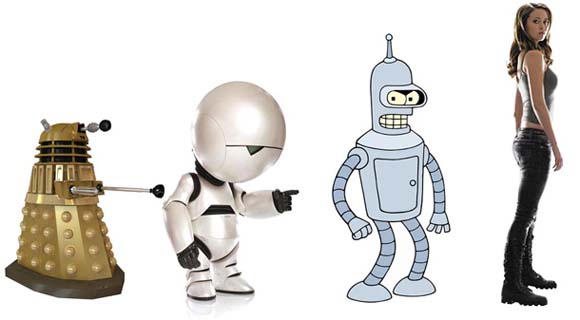
As mentioned earlier, Robert J. Sawyer was in town on Wednesday and gave a talk at UT Dallas about the future of technology. Some of the responsible parties and I attended and listened to his thoughts on Artificial Intelligence, and how its inevitable emergence will affect the world. Sawyer pulled a lot of his thoughts explicitly from his WWW trilogy, and expounded on the philosophy behind his fictional speculations. In the midst of all this, he touched on evolution, ancient human history, the existence of God, and Hollywood’s ambivalent take on A.I. Sawyer’s talk was most interesting to me, however, because of his speculations on the roots and causes of consciousness and intelligence.
 His take on consciousness was stereotypically deterministic and materialistic, which I’ve never found satisfying. For Sawyer, consciousness and self-awareness are simply the results of a certain level of complexity, and it is something that spontaneously occurs at a particular degree of brain development, as if life had hit a saturation point. Even though I am Catholic, the Church doesn’t have much doctrine about consciousness as such, and Catholic theologians who do talk about consciousness generally are repeating Aristotle through the middle-man of St. Thomas Aquinas. It is fitting, I suppose, that a religious body should be more concerned with things that are in the realm of divine revelation (like the immortality of the human soul), and less with speculations about the natural world (like the nature of consciousness).
His take on consciousness was stereotypically deterministic and materialistic, which I’ve never found satisfying. For Sawyer, consciousness and self-awareness are simply the results of a certain level of complexity, and it is something that spontaneously occurs at a particular degree of brain development, as if life had hit a saturation point. Even though I am Catholic, the Church doesn’t have much doctrine about consciousness as such, and Catholic theologians who do talk about consciousness generally are repeating Aristotle through the middle-man of St. Thomas Aquinas. It is fitting, I suppose, that a religious body should be more concerned with things that are in the realm of divine revelation (like the immortality of the human soul), and less with speculations about the natural world (like the nature of consciousness).
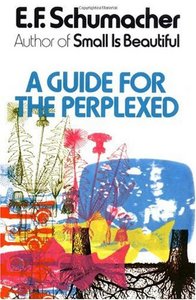 One of the best books I’ve read on the nature of consciousness in all its different forms is E.F. Schumacher’s A Guide for the Perplexed, originally published in 1977. Schumacher pulls a great deal from classical and medieval philosophy about the human mind, and spends a lot of time explaining the ancient idea of the Great Chain of Being. He thus divides the sensible world (i.e., the world that can be observed by the senses) into four, sharply divided areas: mineral, vegetable, animal and human. The higher levels contain all the powers and substances of the lower, but not the other way around. For instance, minerals are composed of matter, and that matter is dead and simply obeys the physical laws of the universe according to its particular composition; however, vegetation is composed of matter but is also alive, and has a life-principle that minerals do not have, which allows it to grow and care for its own being. Animals possess the powers of the two lower levels, as well as the powers of consciousness (in the sense of being aware of the world) and self-produced locomotion. Man, according to Schumacher, possesses all of these powers with the addition of self-awareness, the ability to think about one’s own thinking. Each level evinces an increase not only in power, but also in freedom: a gecko skittering about has more freedom of motion and choice than does the rock it’s skittering upon.
One of the best books I’ve read on the nature of consciousness in all its different forms is E.F. Schumacher’s A Guide for the Perplexed, originally published in 1977. Schumacher pulls a great deal from classical and medieval philosophy about the human mind, and spends a lot of time explaining the ancient idea of the Great Chain of Being. He thus divides the sensible world (i.e., the world that can be observed by the senses) into four, sharply divided areas: mineral, vegetable, animal and human. The higher levels contain all the powers and substances of the lower, but not the other way around. For instance, minerals are composed of matter, and that matter is dead and simply obeys the physical laws of the universe according to its particular composition; however, vegetation is composed of matter but is also alive, and has a life-principle that minerals do not have, which allows it to grow and care for its own being. Animals possess the powers of the two lower levels, as well as the powers of consciousness (in the sense of being aware of the world) and self-produced locomotion. Man, according to Schumacher, possesses all of these powers with the addition of self-awareness, the ability to think about one’s own thinking. Each level evinces an increase not only in power, but also in freedom: a gecko skittering about has more freedom of motion and choice than does the rock it’s skittering upon.
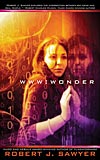 But intelligence really isn’t the same thing as consciousness or self-awareness. Even a flower has a certain level of intelligence in that it “knows” how to process minerals and water and sunlight to its own advantage, and on the cellular level it works almost programmatically to achieve its goals. In this sense, even an automated machine—which is composed of dead minerals—is intelligent, whether it be a train or a computer. Artificial Intelligence has been with us for a long time. What people really mean when they talk about A.I. is Artificial Self-Awareness (A.S.A.), which, if you’re following Schumacher’s levels, must in the case of computers skip all the way from "mineral" to "man." It is something that spontaneously assumes upon itself all the powers of life, consciousness and self-awareness without gradually moving through any stages in-between. Even if one accepts Sawyer’s thesis that human self-awareness was the result of a slow increase in complexity, it is still the increasing complexity of an already-living species. A.S.A. would seem to require the preexistence of a living computer, and then a conscious (aware) computer; only after these things could we expect self-awareness. In WWW: Wake, however, the computerized life-form that subsists in the Internet awakens fully-formed as an A.S.A. without any intermediate stages.
But intelligence really isn’t the same thing as consciousness or self-awareness. Even a flower has a certain level of intelligence in that it “knows” how to process minerals and water and sunlight to its own advantage, and on the cellular level it works almost programmatically to achieve its goals. In this sense, even an automated machine—which is composed of dead minerals—is intelligent, whether it be a train or a computer. Artificial Intelligence has been with us for a long time. What people really mean when they talk about A.I. is Artificial Self-Awareness (A.S.A.), which, if you’re following Schumacher’s levels, must in the case of computers skip all the way from "mineral" to "man." It is something that spontaneously assumes upon itself all the powers of life, consciousness and self-awareness without gradually moving through any stages in-between. Even if one accepts Sawyer’s thesis that human self-awareness was the result of a slow increase in complexity, it is still the increasing complexity of an already-living species. A.S.A. would seem to require the preexistence of a living computer, and then a conscious (aware) computer; only after these things could we expect self-awareness. In WWW: Wake, however, the computerized life-form that subsists in the Internet awakens fully-formed as an A.S.A. without any intermediate stages.
Where are the missing links?
First Things on Science & Religion in Sci-Fi
 Robert R. Chase has a long and interesting article about the ambivalence of science fiction writers when it comes to depicting religion in their novels. He discusses such authors as Arthur C. Clarke, Robert A. Heinlein, Philip K. Dick, Robert J. Sawyer and Gene Wolfe, among others.
Robert R. Chase has a long and interesting article about the ambivalence of science fiction writers when it comes to depicting religion in their novels. He discusses such authors as Arthur C. Clarke, Robert A. Heinlein, Philip K. Dick, Robert J. Sawyer and Gene Wolfe, among others.
An excerpt:
Last year, the blog SF Signal asked writers to weigh in on the question of whether science fiction is antithetical to religion. Fifteen writers took up the challenge. Their outlooks ranged from the sharp-edged atheism of James Morrow to the enthusiastic Christianity of the convert John C. Wright. Readers—and, no doubt, the editors—expected loud anathemas, biting sarcasm, and lordly sneers. Instead, to their surprise and disappointment, a polite consensus emerged: No, the two are not antithetical.
The reasons were varied. Some referenced the many religious science-fiction books and authors as proof that science fiction and religion cannot be antithetical. The atheists, for the most part, recognized that religious belief is a general human characteristic that is not likely to go away, Arthur C. Clarke to the contrary, and that writers thus must be willing to take it seriously to describe characters realistically.
Science Fiction not Literature?
 I was shocked – shocked! – this week to learn that Tor Books has a blog. Well, not so much shocked that they have a blog as the fact that I didn’t know about it…. especially since its URL is www.tor.com. What really surprised me is that the blog isn’t exclusively about books (the top post on Sunday was about Battlestar Galacica), and that it is not limited to science fiction.
I was shocked – shocked! – this week to learn that Tor Books has a blog. Well, not so much shocked that they have a blog as the fact that I didn’t know about it…. especially since its URL is www.tor.com. What really surprised me is that the blog isn’t exclusively about books (the top post on Sunday was about Battlestar Galacica), and that it is not limited to science fiction.
In fact, the post that caught my eye announced the death of John Updike. This, of course, is big news in the world of any fan of literature (speculative or not), but it was an anecdote at the end of the post that really got my blood boiling. You see, one might get away with talking about John Updike on a site like tor.com, if you referenced some of his more surreal work, like The Centaur, which they did, of course. That, however, buys you no credibility among some literati. What do I mean? Here’s the money quote:
"A Harvard professor had said something dismissive about science fiction, and a colleague reminded her that she had taught The Left Hand of Darkness. ‘That’s true,’ she explained patiently, ‘but that’s not science fiction. It’s literature.’”
Oooo…that makes me sooo aaangwy.



















 Full Details
Full Details
